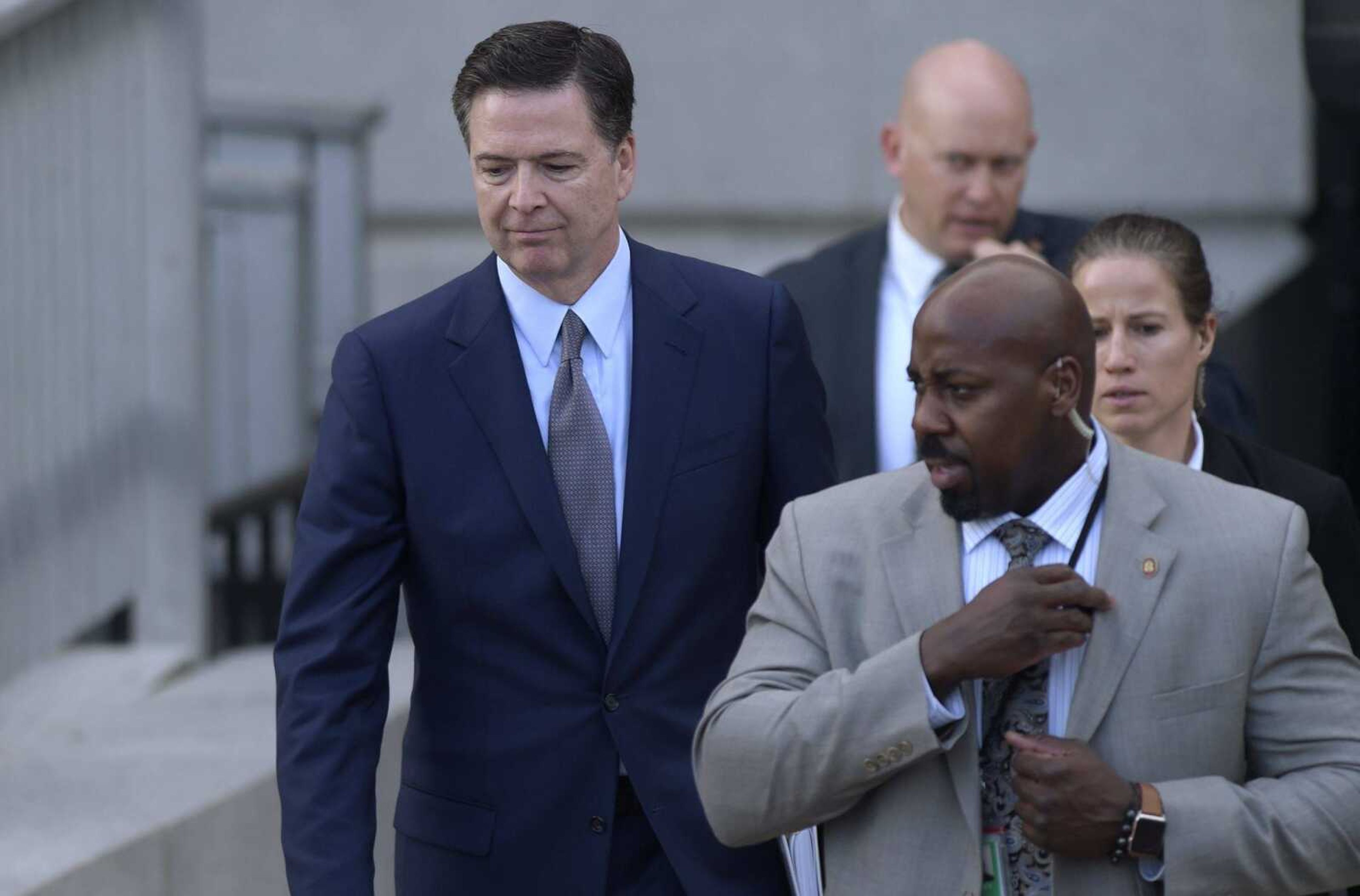House Dems press FBI on Russia, possible link to Trump camp
WASHINGTON -- House Democrats seething over FBI director James Comey's handling of the election-year inquiry of Hillary Clinton confronted the law-enforcement officer over his refusal to say whether the FBI is investigating possible links between President-elect Donald Trump's campaign and Russia...
WASHINGTON -- House Democrats seething over FBI director James Comey's handling of the election-year inquiry of Hillary Clinton confronted the law-enforcement officer over his refusal to say whether the FBI is investigating possible links between President-elect Donald Trump's campaign and Russia.
The contentious, closed-door session Friday reflected the frustration of Democrats who blame Comey's statements and actions in part for Clinton's loss to Trump.
In July, Comey announced the findings of the FBI investigation that found Clinton's use of a private email server was "extremely careless" but not criminal. Then, days before the Nov. 8 election, he sent two letters to Congress, one announcing a review of newly found emails and another saying there was no evidence of wrongdoing.
The Justice Department inspector general announced last week he is investigating Comey and the department.
Democrats and Republicans who attended the all-member briefing Friday with Comey and senior intelligence officials said several lawmakers pressed him in a session about his refusal to say whether there is an examination of alleged contacts between members of the Trump campaign and Russia.
Rep. Steve King, R-Iowa, said the meeting was contentious but said Comey handled himself well under difficult circumstances.
"Yesterday morning if you asked me if I thought Comey was at the end of his career ... I probably would have said 'I think so,"' King said. "Now I think he deserves to be reassessed, just by the way he handled himself. I was impressed."
Frustrated with Comey was Rep. Debbie Wasserman Schultz, D-Fla., forced to resign as head of the Democratic National Committee after hacked emails surfaced that suggested the party operation favored Clinton over her primary rival, Sen. Bernie Sanders, I-Vt.
She confronted Comey, according to a Democrat who attended the briefing. Lawmakers and other congressional officials spoke on condition of anonymity to discuss the private meeting.
Rep. Jerrold Nadler, D-N.Y., asked Comey whehter he had applied a "double standard" in disclosing investigations. Comey previously said his standard was based on whether there is a need to reassure the public about a possible high-profile probe.
"Do you believe that standard has been met with reference to the possible investigation of the Trump campaign's possible connections to the Russian government? And if not, why not?" Nadler asked. The congressman told Comey he should clarify whether the FBI is investigating, as he did with Clinton's email probe.
According to Nadler, Comey responded no, he didn't think it was the same thing and said he couldn't comment further.
"That's what got many people in the room frustrated and upset," Nadler said Saturday. "He was being very hypocritical."
A declassified intelligence report released last week said Russian President Vladimir Putin ordered a hidden campaign to influence the election to favor Trump over Clinton, revelations that have roiled Washington.
Trump and his supporters have staunchly resisted the findings and Trump has leveled a series of broadsides at U.S. intelligence agencies, even though he'll have to rely on their expertise to help him make major national security decisions once he takes over at the White House next week. He will be sworn in Jan. 20.
After the closed-door session, Minority Leader Nancy Pelosi, D-Calif., told reporters: "The American people are owed the truth."
"There is a great deal of evidence to say that this is a high - an issue of high interest to the American people," Pelosi said. "The strength, the integrity of our own democracy. And that for that reason, the FBI should let us know whether they're making - doing that investigation or not. They're usually inscrutable, as you saw in the public testimony in the Senate."
In testimony to the Senate on Tuesday, Comey refused to say whether the FBI was investigating any possible ties between Russia and Trump's presidential campaign, citing policy not to comment on what the FBI might or might not be doing.
"I would never comment on investigations -- whether we have one or not -- in an open forum like this so I can't answer one way or another," Comey told the panel.
Late Friday, the Senate Intelligence Committee announced it would investigate possible contacts between Russia and the people associated with U.S. political campaigns as part of a broader investigation into Moscow's meddling in the 2016 presidential election.
In a statement, Sens. Richard Burr, R-N.C., the committee's chairman, and Mark Warner, D-Va., the panel's top Democrat, said the panel "will follow the intelligence where it leads."
Burr and Warner said that as part of the investigation they will interview senior officials from the Obama administration and the incoming Trump administration. They said subpoenas would be issued "if necessary to compel testimony."
According to the committee's statement, the inquiry will include:
-- A review of the intelligence that informed the declassified report about Russia's interference in the election.
-- "Counterintelligence concerns" related to Russia and the election, "including any intelligence regarding links between Russia and individuals associated with political campaigns."
-- Russian cyber activity and other "active measures" against the United States during the election and more broadly.
Connect with the Southeast Missourian Newsroom:
For corrections to this story or other insights for the editor, click here. To submit a letter to the editor, click here. To learn about the Southeast Missourian’s AI Policy, click here.









